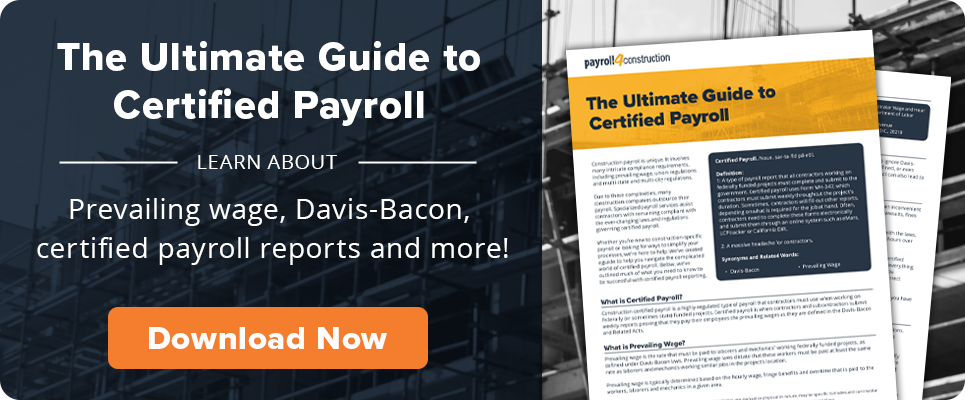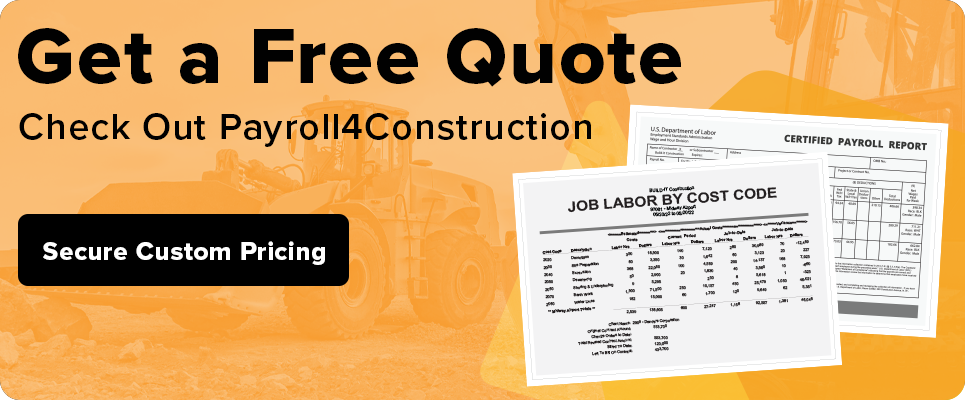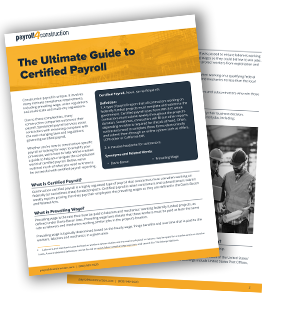Mitigating the Risks of Outsourcing Construction Payroll

August 9, 2022
To have employees is to have payroll, and running any type of payroll — especially in the construction industry — comes with pain points. Operating construction payroll internally can be complicated, time-consuming, and costly. Then there are the necessary compliance requirements to manage and all of the legal ramifications that come with any incorrect tax reports.
Outsourcing construction payroll has become an efficient solution for reducing the financial risks and administrative burdens associated with in-house payroll. However, delegating such sensitive information to a third party is a considerable decision for any business owner to make.
As you assess the capacity of your internal construction payroll software — and try to determine whether it’s time to make any changes to your payroll operations — it’s common for these questions to come up:
- When is the right time to outsource your construction payroll?
- How do you choose the best-fitting payroll provider?
- What are the advantages as well as the disadvantages of outsourcing construction payroll?
- What are some ways to alleviate these risks associated with construction payroll outsourcing?
These are all valid considerations. We’re here to provide some clarity to these questions so that whatever decision you make can be made with well-informed confidence.
When Should You Outsource Construction Payroll?
Outsourcing payroll is when a construction company or contractor delegates their construction payroll operations to a third party. This can be done in two ways:
- Part-time management, or co-outsourcing — a portion of your construction payroll is handled externally while the remainder is completed in-house.
- Full-time management — a vendor handles the entirety of your construction payroll operations.
As you consider outsourcing, evaluate your current payroll processes, and ask yourself some of the following questions:
- Is certified payroll a lengthy and cumbersome process for your payroll staff?
- Are you able to stay up to date with ever-evolving compliance regulations?
- Are you able to track and accurately pay field employees who work in varying cities and states with changing pay rates?
- Do you need state or locality-specific certified payroll reports that go beyond the standard Federal form?
- Have you been penalized or fined for errors/ omissions in your tax filings?
- Do you have staffing issues in your accounting/ payroll departments, and/or could you use these staff members to perform other crucial business functions?
- If you’re a general contractor, do you struggle to get sub-contractors to pay you?
If you’re uncertain in your responses, then now is a good opportunity to start researching options to alleviate these strains on your construction payroll processes.
Advantages of Outsourcing Your Payroll
The construction industry is a competitive, fast-moving environment. The advantages associated with outsourcing your payroll provide you the opportunity to keep pace. These advantages include:
- Alleviating Administrative Worry — While your expert payroll provider handles all the nuances of certified payroll, prevailing wages, and compliance reporting, management can breathe easier knowing that their payroll can’t be derailed should there be illness, vacations, or people leaving.
- Cost Efficiency — Outsourcing payroll eliminates the need to purchase or continually upgrade the technology and software associated with operating everything in-house. Additionally, the improved compliance accuracy helps prevent the financial losses caused by filing errors.
- Minimizing Time Invested — Delegating payroll responsibilities frees up space in your administrative schedule, allowing for more opportunities to focus on other initiatives.
- Better Compliance — By outsourcing to entrusted payroll experts — who have immense knowledge of local, regional, and national regulations and whose sole objective is to effectively manage your payroll — mistakes are reduced, deadlines are upheld, and compliance monitoring is consistent.
The Disadvantages of Outsourcing Your Payroll
Although the benefits of outsourcing payroll are extensive, you may still be uncertain if it’s a good move for your company, especially if you’ve been burned in the past. The hesitation can be influenced by:
- Negative Past Experiences — You’ve previously tried working with a big-name payroll provider, and they weren’t able to meet your demands or handle all the nuances of construction payroll.
- Hidden Costs — Ambiguous contracts outline all the upfront reoccurring subscription dues, but they fail to mention installation charges, maintenance fees and other additional payments subjective to the specific services you need.
- Assuming It’s All or Nothing — This can be two-fold.
- You’re exclusively interested in outsourcing payroll — with the option to add-on products later — but some providers only offer massive packages that include multiple software products, most of which you don’t need or want right away.
- You think you do, in fact, need everything right away — like a payroll service with HR — and the providers aren’t offering what you want.
- Employee PushBack — The administration is ready to transition the company’s payroll processes over to a payroll provider, but employees are resistant to the change.
Reducing the Risks of Outsourcing Payroll
Despite these risks, don’t be too quick to write off outsourcing! There are many ways to troubleshoot these unwanted experiences.
Select an Experienced Payroll Provider
Optimizing your payroll outsourcing starts with selecting the best-fitting provider for your company. You’ll want to figure out your company’s needs and the ‘must-have’ services a provider has to be able to perform. Keep in mind that it’s ok to start with standard packages and add features or products on as your payroll demands evolve.
Then research. This will be an ongoing relationship and it’s important to never settle on your most important needs. Consider the following questions to help you sort out which payroll provider is best suited to operate your payroll processes:
- How long has the payroll provider been in business?
- Is that provider knowledgeable about the construction industry, specifically?
- Does the payroll provider have the bandwidth to handle all of your payroll information?
- Is the payroll provider adaptable enough to handle your needs as your company expands?
- Does the payroll provider have the tools you need? Will there be opportunities to add features or products to your service package in the future if your needs change?
- How does the payroll provider integrate with your accounting software, if at all?
There are so many complexities involved, specifically with construction payroll — like union tracking, job costing, certified payroll, prevailing wages, and whatever other reports your jobs require. Confirming that your potential payroll provider is able to handle these nuances is a good start in your decision-making process.
Maintain Open Communication
The provider may handle your construction payroll, but you’re still paying for their services. Early on, be quick to establish an open, consistent dialogue. Make sure to know who your main contacts are:
- Who is the person actually running the payroll?
- Who acts as the troubleshooter?
- Who do you go to when you have questions?
Maintaining open communication will allow for quicker resolutions if a problem should ever arise. Stay involved with continuous check-ins. Make yourself aware of how the payroll provider runs their software so you know what to expect when your reports are generated. Ensure that all contracts are concise to help reduce uncertainty. Read through documents thoroughly before signing to identify hidden costs. Don’t hesitate to address concerns with their experts.
Set Clear Expectations
The payroll provider works for you. Even though they run your payroll, you can still control adjacent elements, such as:
- Establishing schedules — outline what you need to be done and when you need it done.
- Set a clear division of labor — make sure all employee responsibilities for producing and submitting payroll to the provider is established.
- Communicate your expectations — let everyone know the outcomes you’re anticipating and express any dissatisfaction in performance promptly so possible adjustments can be made.
In Conclusion
Outsourcing is a solution for handling the pain points of construction payroll processing — time can be saved, costs can be reduced and errors can be mitigated. To diminish the risks involved with bringing in an outside party, it’s important to stay actively invested in your payroll operations.
Choose a payroll service that understands the niches of construction payroll. Make sure the provider has a reliable history. Know the people you’re working with and what rolls belong to whom. Understand how the provider’s system operates. Keep your employee information updated. Set your standards and communicate at all times. With these steps in mind, you can mitigate any potential risk when choosing to outsource your payroll.
Share Article



